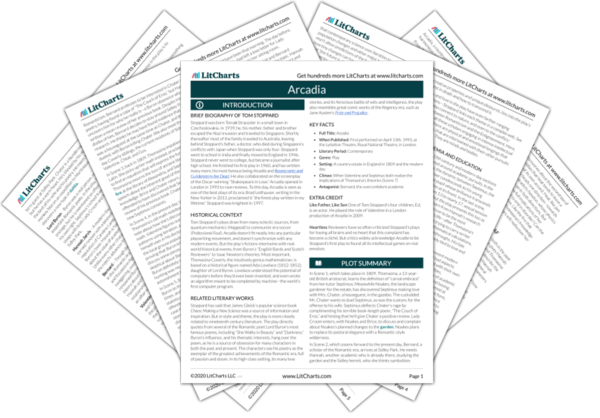Summary
Analysis
Bernard reads his paper about the Chater-Byron duel to the Coverly siblings. Partway through, Hannah enters with a copy of a letter related to their research. Bernard continues, sketching out the game book evidence of Byron’s stay at Sidley Park, then explaining why the invitations to duel were directed at Byron. As a key piece of evidence, Bernard incorrectly identifies Byron as the author of the Piccadilly review of “The Maid of Turkey.” Hannah is very skeptical about all this, asking why Byron never mentioned the review in his letters, among other things.
Bernard’s paper demonstrates how academia frames and shapes history. The play is perpetually concerned with questions of taste. Who gets to decide who’s good and who’s bad, who’s famous and who’s obscure? Part of it is randomness, but part of it is people like Bernard boldly imposing their vision. Neither future nor past is set in stone.
Themes
The argument escalates, and Bernard calls Caroline Lamb, beloved subject of Hannah’s bestseller, talentless. Valentine mentions that statistical analyses of the Piccadilly review didn’t convincingly connect it to Byron’s other writings. Bernard, by now very angry, lays out in a monologue why poetry and philosophy is more important than science. Art, he says, is always timely, but science is irrelevant to human life. “I can’t think of anything more trivial than the speed of light,” says Bernard, quoting Byron’s love poem “She walks in beauty.”
Bernard’s speech is the play’s clearest articulation of the positive side of Romanticism. Bernard compellingly shows that poetry is more relevant to the specifics of human emotion than science. The gorgeous lines from Byron demonstrate Bernard’s authentic love of his material. He may be egotistical, but he conveys that poetry is a legitimate way to approach the mysteries of life.
Themes
Valentine leaves, almost crying, declaring that he’s giving up on his grouse project. Chloë follows. Bernard gives Hannah the unwelcome news that the depiction of Caroline Lamb and Byron on the dust jacket of her book has been proven not actually to be them. Hannah rebuts this in the same way that Bernard has tried to prove his Byron-Chater idea, by saying she just has a gut feeling that she’s right. Bernard invites Hannah to come attend his lecture in London, and afterward “for sex.”
So far, Hannah’s seemed purely responsible, and Bernard much less careful. But Hannah, it turns out, falls into the same traps as Bernard. She wants to believe in her dust jacket image, and is just as unwilling to change her views to fit the evidence. Maybe this switch into blind passion attracts Bernard.
Themes
Hannah explains a bit of her romantic history. She’s tired of men always so focused on sex, and has refused marriage proposals, because to her there’s no worse bargain than “Available sex against not being allowed to fart in bed.”
Get the entire Arcadia LitChart as a printable PDF.

Bernard prepares to leave for London, but explains he’s coming back for the party, which he’ll be attending with Chloë. In fact, Bernard confesses arrogantly, they’ve been sleeping together for some time. Hannah slaps Bernard. Bernard, not dissuaded, reads Hannah a bit of 19th-century travel writing that mentions the Sidley hermit, who had a tortoise named Plautus. (We, though not Hannah, know that Septimus’s tortoise was called Plautus.) Valentine returns and Bernard leaves for his taxi.
Bernard’s actions here recall Septimus’s in the first scene. Like Septimus, Bernard reveals a huge bit of sex-related information, and then quickly follows with a return to academics. What’s a distraction from what? In the play, both sex and academia are modes of connection and immortality, both are equally important and equally a part of being human.
Themes
Hannah reads Valentine a little from the new source about the hermit. The article, from 1832, describes the hermit as convincing himself with math that the world would end. The article expresses the hermit’s ideas via a fire-based simile, “as a wooden stove that must consume itself until ash and stove are as one, and heat is gone from the earth.” Valentine identifies this theory as the second law of thermodynamics, which describes how everything is headed towards entropy. Hannah wonders if this connects to Thomasina’s work.
Though the hermit was seen as a madman, his ravings are apparently accurate. The universe will (probably) decay from order into disorder until it reaches a state of “thermodynamic equilibrium,” coldness and darkness. There are two kinds of disorder in Thomasina’s theorizing—the small disorder of things like leaf-shapes, and the ultimate disorder of entropy.
Themes
Hannah notes that Septimus Hodge and the hermit were born in the same year, 1787. She starts to believe that they may be the same person, and modifies her thesis. The hermit isn’t a symbol Romantic nonsense spun out of control, but of Enlightenment scientific progress, forced to live in a hut in a Romantic landscape. She’s sure she’ll find proof of the hermit’s real identity.
Hannah’s modification shows how she embodies Enlightenment-style priorities. Unlike Bernard, who takes a point of view and tries to hammer truth to fit it, Hannah’s willing to reconsider her stance after new evidence.
Themes












